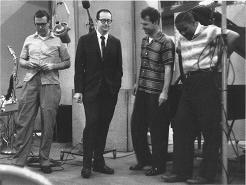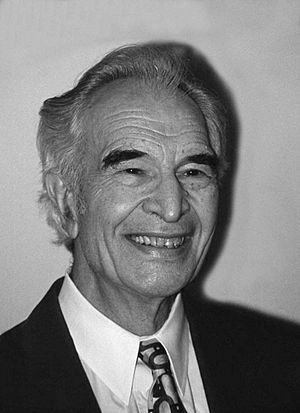Dave Brubeck facts for kids
Quick facts for kids
Dave Brubeck
|
|
|---|---|
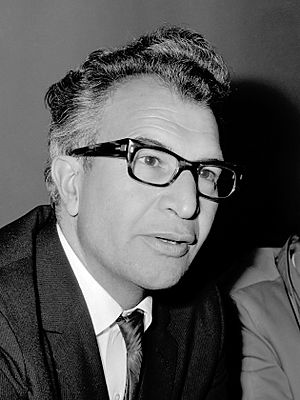
Brubeck in 1964
|
|
| Background information | |
| Birth name | David Warren Brubeck |
| Born | December 6, 1920 Concord, California, U.S. |
| Died | December 5, 2012 (aged 91) Norwalk, Connecticut, U.S. |
| Genres | Jazz, cool jazz, West Coast jazz, third stream |
| Occupation(s) | Musician, composer, bandleader |
| Instruments | Piano |
| Years active | 1940s–2012 |
| Labels | Fantasy Records, Columbia, Legacy, Sony, Decca, Atlantic, A&M, Concord, MusicMasters, Telarc, Naxos |
| Associated acts | Paul Desmond, Eugene Wright, Joe Morello, Gerry Mulligan |
David Warren Brubeck (born December 6, 1920 – died December 5, 2012) was an American jazz pianist and composer. He was famous for a style of jazz called "cool jazz." Many of his songs became well-known jazz tunes, like "In Your Own Sweet Way" and "The Duke."
Dave's music could be calm and smooth, or big and exciting. This was because he learned classical music from his mom and also loved to make up music on the spot. He was known for using unusual time signatures in his songs. This means his music often had different rhythms and beats that were not common.
Brubeck loved to try out different time signatures. For example, he recorded "Unsquare Dance" in a 7
4 beat. He also wrote "World's Fair" in 13
4 and "Blue Rondo à la Turk" in 9
8. Besides jazz, he wrote music for orchestras and religious ceremonies. He also created music for TV shows like Mr. Broadway and This Is America, Charlie Brown.
Many people think Dave Brubeck wrote the famous jazz song "Take Five." But it was actually written by his bandmate, alto saxophonist Paul Desmond. "Take Five" is on one of the best-selling jazz albums, Time Out. It uses a 5
4 beat and is still a jazz classic linked to Brubeck.
Contents
Dave Brubeck's Early Life and Music Journey
Dave Brubeck was born in Concord, California, near San Francisco. He grew up in Ione, California. His father, Peter Howard "Pete" Brubeck, was a cattle rancher. His mother, Elizabeth, had studied piano in England. She taught piano to earn extra money.
Dave's family had Swiss and possibly Native American roots. He didn't plan to be a musician, even though his two older brothers were already studying music. He took piano lessons from his mother. But he couldn't read music well because of poor eyesight. He managed to play by ear, so his teacher didn't notice his difficulty.
Brubeck first went to the College of the Pacific in Stockton, California, to study animal science. He wanted to work on his family's ranch. But the head of the zoology department told him his mind was on music. He encouraged Dave to switch his major to music. Later, a professor almost kicked him out because he couldn't read music on sight. But other teachers said his ability to write complex music made up for it. The college let him graduate, but only if he promised never to teach piano.
After college in 1942, Brubeck joined the United States Army. He served in Europe during World War II. He played piano at a Red Cross show and was so good that he was told to form a band instead of fighting. He created "The Wolfpack," one of the first U.S. Army bands with musicians of different races. In 1944, he met Paul Desmond in the military.
After almost four years in the army, Dave went back to California. He studied at Mills College in Oakland. His teacher, Darius Milhaud, told him to study how to write complex music for orchestras, but not classical piano.
In 1949, Dave Brubeck made his first recordings with a band called the octet, and later his trio. These records sold very well. Soon, his record company, Fantasy Records, was selling many copies of his music.
The Famous Dave Brubeck Quartet
|
Dave Brubeck Quartet
|
|
|---|---|
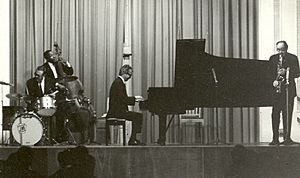
The Dave Brubeck Quartet in 1967; left to right: Joe Morello, Eugene Wright, Dave Brubeck and Paul Desmond
|
|
| Background information | |
| Origin | San Francisco, California, United States |
| Genres | Jazz |
| Years active | 1951–2012 |
| Past members | Dave Brubeck Paul Desmond Bob Bates Joe Dodge Ron Crotty Lloyd Davis Joe Morello Norman Bates Eugene Wright Gerry Mulligan Jack Six Alan Dawson Darius Brubeck Chris Brubeck Dan Brubeck Bobby Militello Alec Dankworth Michael Moore Randy Jones |
In 1951, Brubeck hurt his neck while diving in Hawaii. He recovered, but his hands had nerve pain for years. This injury changed how he played the piano. He started using more complex, blocky chords instead of fast, single notes.
In 1951, Brubeck formed the Dave Brubeck Quartet with Paul Desmond on alto saxophone. They played for a long time at the Black Hawk nightclub in San Francisco. They became very popular by touring college campuses. They recorded albums like Jazz at Oberlin (1953) and Jazz Goes to College (1954).
In 1954, Dave Brubeck was on the cover of Time magazine. He was only the second jazz musician to get this honor. The first was Louis Armstrong. Brubeck felt a bit embarrassed because he thought Duke Ellington deserved it more. He believed he was chosen because he was white.
In 1956, Brubeck hired drummer Joe Morello. Morello's drumming helped the band try out new rhythms. In 1958, African-American bassist Eugene Wright joined the group. They went on a tour for the U.S. government, visiting countries like Poland, Turkey, and India. Wright became a full member in 1959, completing the "classic" Quartet. Brubeck often canceled concerts if club owners did not want an integrated band. He also refused to appear on TV if they tried to keep Wright off-camera.
In 1959, the Dave Brubeck Quartet recorded Time Out. The record company liked the album but was unsure about releasing it. The album had all new songs, and most of them used unusual time signatures. These included 9
8, 5
4, 3
4, and 6
4. Brubeck got these ideas from folk music he heard during his tour in Europe and Asia.
Despite the unusual rhythms, the album quickly became a huge hit. It sold over a million copies, making it the first jazz album to do so. It included famous songs like "Take Five," "Blue Rondo à la Turk," and "Three to Get Ready."
After Time Out, they released more albums with similar ideas. These included Time Further Out: Miro Reflections (1961), Countdown—Time in Outer Space (1962), Time Changes (1963), and Time In (1966). These albums often had modern paintings as their cover art.
In the early 1960s, Brubeck and his wife, Iola, created a jazz musical called The Real Ambassadors. It was based on their experiences touring other countries. The album for the musical featured famous artists like Louis Armstrong.
At its most popular, the Brubeck Quartet released up to four albums a year. Besides the "College" and "Time" series, Brubeck recorded albums based on their travels. These included Jazz Impressions of the U.S.A. (1956), Jazz Impressions of Eurasia (1958), Jazz Impressions of Japan (1964), and Jazz Impressions of New York (1964). These albums gave us songs like "Summer Song" and "Koto Song."
The "Classic" Quartet's last studio album for Columbia was Anything Goes (1966). It featured songs by Cole Porter. Their final concert recording was The Last Time We Saw Paris (1967).
Band Members Over Time

| Years | Lineup |
|---|---|
| 1951–1956 |
|
| 1953 (Jazz at Oberlin) |
|
| 1956–1958 |
|
| 1958–1968 (Classic quartet) |
|
| 1968–1972 ("The Dave Brubeck Trio & Gerry Mulligan") |
|
| 1972–1978 ("The New Brubeck Quartet") |
|
| 1976–1977 (Classic quartet reunion – 25th anniversary) |
|
| 1977–Early 2000s |
|
| 1978–1982 |
|
| Early 2000s–2012 |
|
Dave Brubeck's Later Career and Life
Brubeck continued to create new music. In 1968, he wrote The Gates of Justice. This was a cantata, a type of musical piece, that combined parts of the Bible with words from Dr. Martin Luther King Jr..
In 1971, his record company, Columbia Records, decided not to renew his contract. They wanted to focus more on rock music. So, Brubeck moved to Atlantic Records. His music was also used in the 1985 film Ordeal by Innocence. He also composed for a 1988 episode of the TV series This Is America, Charlie Brown.
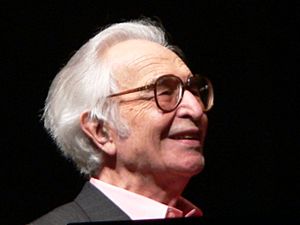
Dave Brubeck married jazz lyricist Iola Whitlock in September 1942. They were married for 70 years until his death in 2012. Iola passed away in 2014.
Four of Brubeck's six children became professional musicians. Darius, the oldest, is a pianist and composer. Dan is a drummer, and Chris plays many instruments and composes. Matthew, the youngest, is a cellist. Brubeck's children often played with him in concerts and recordings.
Brubeck became a Catholic in 1980. He said he "just joined the Catholic Church" because he wasn't anything else before. In 1996, he received the Grammy Lifetime Achievement Award. In 2006, he received the Laetare Medal from the University of Notre Dame. This is a very old and important award for American Catholics.
In 2000, Brubeck and his wife, Iola, started the Brubeck Institute at their old college, the University of the Pacific. It began as a place to keep their personal documents. Now, it offers special programs and learning chances in jazz for students. One of the main streets at the school is now called Dave Brubeck Way.
Awards and Honors for Dave Brubeck
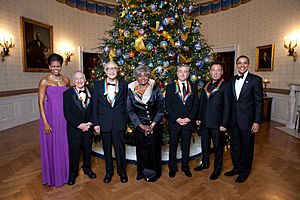
An asteroid in space, 5079 Brubeck, was named after him.
Dave Brubeck often returned to Michigan to perform. In 2006, he received a Distinguished Artist Award from the University of Michigan. On April 8, 2008, United States Secretary of State Condoleezza Rice gave Brubeck the "Benjamin Franklin Award for Public Diplomacy." She said his music offered an American "vision of hope, opportunity and freedom." The State Department said Brubeck's work showed "the best of America's cultural diplomacy."
On May 28, 2008, California Governor Arnold Schwarzenegger announced that Brubeck would be added to the California Hall of Fame. He was inducted with eleven other famous Californians.
Brubeck also supported the Jazz Foundation of America. This group helps older jazz and blues musicians. He performed at their yearly benefit concert, "A Great Night in Harlem." In October 2008, he received an honorary Doctor of Music degree from the Eastman School of Music.
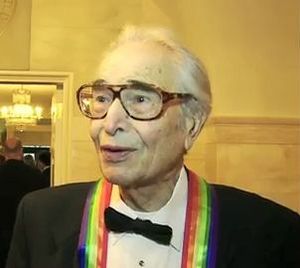
In September 2009, the Kennedy Center announced Brubeck as a Kennedy Center Honoree. This award celebrates excellence in performance arts. The ceremony took place on December 6, Brubeck's 89th birthday. President Barack Obama said, "You can't understand America without understanding jazz, and you can't understand jazz without understanding Dave Brubeck."
On September 20, 2009, Brubeck received another honorary Doctor of Music degree from Berklee College of Music. In 2010, he received an honorary Doctor of Music degree from the George Washington University. He also received the Miles Davis Award at the Montreal International Jazz Festival.
In 2010, a documentary about Brubeck called Dave Brubeck: In His Own Sweet Way was made. It celebrated his 90th birthday.
Dave Brubeck's Death and Lasting Impact
Dave Brubeck passed away from heart failure on December 5, 2012, one day before his 92nd birthday. He was on his way to a doctor's appointment. A birthday concert had been planned for him with his family and famous friends.
The Los Angeles Times called him "one of Jazz's first pop stars." But he wasn't always happy with his fame. He felt uncomfortable that Time magazine featured him before Duke Ellington. He said, "It just bothered me."
The New York Times noted that he kept playing well into his old age. He performed in 2011 and even in 2010, just a month after getting a pacemaker. Music writer Nate Chinen said Brubeck's playing became "something almost airy."
Music journalist Ivan Hewett wrote that Brubeck's list of works was amazing. It included large musical pieces, musicals, and hundreds of jazz songs. John Fordham from The Guardian said Brubeck was great at mixing European music ideas, complex rhythms, jazz songs, and improvisation. His son Chris said some of his music reminded him of famous American composers like Aaron Copland.
The Economist wrote that people found it hard to believe that such successful jazz was played by a modest family man. He was a laid-back Californian who would have happily been a rancher. But he couldn't live without performing because the rhythm of jazz was "the rhythm of his heart."
Concord Boulevard Park in his hometown of Concord, California, was renamed "Dave Brubeck Memorial Park." Mayor Dan Helix said, "He will be with us forever because his music will never die."
On the day Brubeck died, musicians Chick Corea and Gary Burton played a tribute to him in Toronto. Corea played "Strange Meadow Lark" from Brubeck's Time Out album.
Brubeck is buried in Umpawaug Cemetery in Redding, Connecticut.
In the United States, May 4 is sometimes called "Dave Brubeck Day." This is because May 4 is written as "5/4" in the U.S., which is the time signature of his most famous song, "Take Five."
In 2019, a book called Dave Brubeck's Time Out was published. It looked closely at his famous album. In 2020, a full biography of Brubeck, Dave Brubeck: A Life in Time, was published.
Dave Brubeck's Awards
- Connecticut Arts Award (1987)
- National Medal of Arts, National Endowment for the Arts (1994)
- DownBeat Hall of Fame (1994)
- Grammy Lifetime Achievement Award (1996)
- Doctor of Sacred Theology, Doctorate honoris causa, University of Fribourg, Switzerland (2004)
- Laetare Medal (University of Notre Dame) (2006)
- BBC Jazz Lifetime Achievement Award (2007)
- Benjamin Franklin Award for Public Diplomacy (2008)
- Inducted into California Hall of Fame (2008)
- Eastman School of Music Honorary Degree (2008)
- Kennedy Center Honors (2009)
- George Washington University Honorary Degree (2010)
- Honorary Fellow of Westminster Choir College, Princeton, New Jersey (2011)
Dave Brubeck's Music Albums
As the Main Artist
| Year recorded | Title | Label | Musicians/Notes |
|---|---|---|---|
| 1946–48? | Old Sounds From San Francisco | ||
| 1946–50 | Dave Brubeck Octet | Fantasy | Octet, with Paul Desmond (alto sax), Jack Weeks (bass), Cal Tjader (drums), William O. Smith (clarinet), Bob Collins (baritone sax), Dick Collins (trumpet), Dave Van Kriedt (tenor sax); re-release of earlier recordings |
| 1950 | The Dave Brubeck Trio | Fantasy | Trio, with Ron Crotty (bass), Cal Tjader (vibraphone, drums, percussion) (Volumes 1 & 2) |
| 1951? | Brubeck/Desmond | Fantasy | |
| 1952? | Jazz at Storyville | Fantasy | |
| 1952 | The Dave Brubeck Quartet | Fantasy | Quartet, with Paul Desmond (alto sax), Bull Ruther (bass), Herb Barman and Lloyd Davis (drums); re-release included a track from 1954 |
| 1952 | Jazz at the Blackhawk | Fantasy | |
| 1953 | Jazz at Oberlin | Fantasy | Quartet, with Paul Desmond (alto sax), Ron Crotty (bass), Lloyd Davis (drums); live concert |
| 1953 | Brubeck & Desmond at Wilshire-Ebell | Fantasy | Quartet, with Paul Desmond (alto sax), Ron Crotty (bass), Lloyd Davis (drums); live concert |
| 1953 | Jazz at the College of the Pacific | Fantasy | Quartet, with Paul Desmond (alto sax), Ron Crotty (bass), Joe Dodge (drums); live concert |
| 1953? | Jazz at the College of the Pacific, Vol. 2 | OJC | |
| 1954? | Dave Brubeck at Storyville: 1954 | Columbia | |
| 1954 | Jazz Goes to College | Columbia | Quartet, with Paul Desmond (alto sax), Bob Bates (bass), Joe Dodge (drums); live concert |
| 1954 | Brubeck Time | Columbia | Quartet, with Paul Desmond (alto sax), Bob Bates (bass), Joe Dodge (drums) |
| 1954–55 | Jazz: Red Hot and Cool | Columbia | Quartet, with Paul Desmond (alto sax), Bob Bates (bass), Joe Dodge (drums); live concert |
| 1956 | Brubeck Plays Brubeck | Columbia | Solo piano |
| 1956 | Dave Brubeck and Jay & Kai at Newport | Columbia | Quartet, with Paul Desmond (alto sax), Norman Bates (bass), Joe Dodge (drums); live concert; album shared with another band |
| 1957 | Jazz Impressions of the U.S.A. | Columbia | Quartet, with Paul Desmond (alto sax), Norman Bates (bass), Joe Morello (drums) |
| 1957 | Dave Brubeck Plays and Plays and... | Fantasy | Solo piano |
| 1957 | Reunion | Fantasy | Quintet, with Paul Desmond (alto sax), Dave Van Kriedt (tenor sax), Norman Bates (bass), Joe Morello (drums) |
| 1957? | Jazz Goes to Junior College | Columbia | |
| 1957 | Dave Digs Disney | Columbia | Quartet, with Paul Desmond (alto sax), Norman Bates (bass), Joe Morello (drums) |
| 1958 | The Dave Brubeck Quartet in Europe | Columbia | Quartet, with Paul Desmond (alto sax), Eugene Wright (bass), Joe Morello (drums); live concert |
| 1958 | Newport 1958 | Columbia | Quartet, with Paul Desmond (alto sax), Joe Benjamin (bass), Joe Morello (drums); live concert |
| 1958 | Jazz Impressions of Eurasia | Columbia | Quartet, with Paul Desmond (alto sax), Joe Benjamin (bass), Joe Morello (drums); live concert |
| 1959 | Gone with the Wind | Columbia | Quartet, with Paul Desmond (alto sax), Eugene Wright (bass), Joe Morello (drums) |
| 1959 | Time Out | Columbia | Quartet, with Paul Desmond (alto sax), Eugene Wright (bass), Joe Morello (drums) |
| 1960 | The Riddle | Columbia | Quartet, with Bill Smith (clarinet), Eugene Wright (bass), Joe Morello (drums) |
| 1960 | Southern Scene | Columbia | Quartet, with Paul Desmond (alto sax), Eugene Wright (bass), Joe Morello (drums) |
| 1960 | Brubeck and Rushing | Columbia | Quintet, with Paul Desmond (alto sax), Eugene Wright (bass), Joe Morello (drums), Jimmy Rushing (vocals) |
| 1960 | Bernstein Plays Brubeck Plays Bernstein | Columbia | With Paul Desmond (alto sax), Eugene Wright (bass), Joe Morello (drums), New York Philharmonic |
| 1960 | Brubeck à la mode | Fantasy | Quartet, with Bill Smith (clarinet), Eugene Wright (bass), Joe Morello (drums) |
| 1960 | Tonight Only! | Columbia | Quintet, with Paul Desmond (alto sax), Eugene Wright (bass), Joe Morello (drums), Carmen McRae (vocals) |
| 1960 | Near-Myth | Fantasy | Quartet, with Bill Smith (clarinet), Eugene Wright (bass), Joe Morello (drums) |
| 1961 | Time Further Out | Columbia | Quartet, with Paul Desmond (alto sax), Eugene Wright (bass), Joe Morello (drums) |
| 1961 | Brandenburg Gate: Revisited | Columbia | With Paul Desmond (alto sax), Eugene Wright (bass), Joe Morello (drums), orchestra |
| 1961 | Take Five Live | Columbia | Quintet, with Paul Desmond (alto sax), Eugene Wright (bass), Joe Morello (drums), Carmen McRae (vocals); live concert |
| 1961 | The Real Ambassadors | Columbia | Soundtrack for the musical |
| 1961–62 | Countdown—Time in Outer Space | Columbia | Quartet, with Paul Desmond (alto sax), Eugene Wright (bass), Joe Morello (drums) |
| 1962 | Bennett/Brubeck: The White House Sessions, Live 1962 | Columbia Legacy | with Tony Bennett (vocals); released in 2013 |
| 1962 | Bossa Nova U.S.A. | Columbia | Quartet, with Paul Desmond (alto sax), Eugene Wright (bass), Joe Morello (drums) |
| 1962 | Brubeck in Amsterdam | Columbia | Quartet, with Paul Desmond (alto sax), Eugene Wright (bass), Joe Morello (drums); live concert; released in 1969 |
| 1963 | The Dave Brubeck Quartet at Carnegie Hall | Columbia | Quartet, with Paul Desmond (alto sax), Eugene Wright (bass), Joe Morello (drums); live concert |
| 1964 | Time Changes | Columbia | With Paul Desmond (alto sax), Eugene Wright (bass), Joe Morello (drums), orchestra |
| 1964 | Jazz Impressions of Japan | Columbia | Quartet, with Paul Desmond (alto sax), Eugene Wright (bass), Joe Morello (drums) |
| 1964 | Jazz Impressions of New York | Columbia | Quartet, with Paul Desmond (alto sax), Eugene Wright (bass), Joe Morello (drums) |
| 1964 | Dave Brubeck in Berlin | CBS | Quartet, with Paul Desmond (alto sax), Eugene Wright (bass), Joe Morello (drums); live concert |
| 1962–65 | Angel Eyes | Columbia | Quartet, with Paul Desmond (alto sax), Eugene Wright (bass), Joe Morello (drums) |
| 1962–65 | My Favorite Things | Columbia | Quartet, with Paul Desmond (alto sax), Eugene Wright (bass), Joe Morello (drums) |
| 1965 | Time In | Columbia | Quartet, with Paul Desmond (alto sax), Eugene Wright (bass), Joe Morello (drums) |
| 1966 | Anything Goes! The Dave Brubeck Quartet Plays Cole Porter | Columbia | Quartet, with Paul Desmond (alto sax), Eugene Wright (bass), Joe Morello (drums) |
| 1966 | Jackpot! | Columbia | Quartet, with Paul Desmond (alto sax), Eugene Wright (bass), Joe Morello (drums); live concert |
| 1967 | Bravo! Brubeck! | Columbia | With Paul Desmond (alto sax), Chamin Correa (guitar), Eugene Wright (bass), Joe Morello (drums), Salvatore Agueros (bongo, conga); live concert |
| 1967 | Buried Treasures | Columbia Legacy | Quartet, with Paul Desmond (alto sax), Eugene Wright (bass), Joe Morello (drums); live concert; released in 1998 |
| 1967 | The Last Time We Saw Paris | Columbia | Quartet, with Paul Desmond (alto sax), Eugene Wright (bass), Joe Morello (drums); live concert |
| 1967 | Their Last Time Out: The Unreleased Live Concert, December 26, 1967 | Columbia Legacy | Live concert; released in 2011 |
| 1968? | Compadres | Columbia | Live concert |
| 1968? | Blues Roots | Columbia | |
| 1968? | The Light in the Wilderness | Decca | |
| 1969? | The Gates of Justice | Decca | |
| 1970? | Brubeck/Mulligan/Cincinnati | Decca | |
| 1970 | Live at the Berlin Philharmonie | Columbia | Quartet, with Gerry Mulligan (baritone sax), Jack Six (bass), Alan Dawson (drums); live concert |
| 1971? | Summit Sessions | Columbia | |
| 1971 | The Last Set at Newport | Atlantic | Quartet, with Gerry Mulligan (baritone sax), Jack Six (bass), Alan Dawson (drums); live concert |
| 1971? | Truth Is Fallen | Atlantic | |
| 1972 | We're All Together Again for the First Time | Atlantic | Quintet, with Gerry Mulligan (baritone sax), Paul Desmond (alto sax), Jack Six (bass), Alan Dawson (drums); live concert |
| 1973 | Two Generations of Brubeck | Atlantic | With Darius Brubeck (electric piano, piano, clavinet), Jerry Bergonzi (soprano sax, tenor sax), Chris Brubeck (electric bass, trombone), Dan Brubeck (drums), Randie Powell (percussion), David Powell (double bass), Perry Robinson (clarinet), Peter "Madcat" Ruth (harmonica, Jew's harp), David Dutemple (electric bass), Richie Morales (drums), Stephan Dudash (violin), Dave Mason (guitar), Jimmy Cathcart (electric piano) |
| 1973–74 | All the Things We Are | Atlantic | One track trio, with Jack Six (bass), Alan Dawson (drums); some tracks quartet, with Lee Konitz (alto sax), Six (bass), Roy Haynes (drums); one track quintet, with Anthony Braxton (alto sax) added; one track quartet with Braxton replacing Konitz |
| 1974 | Brother, the Great Spirit Made Us All | Atlantic | With Darius Brubeck (electric piano), Jerry Bergonzi (soprano sax, tenor sax), Chris Brubeck (electric bass, trombone), Dan Brubeck (drums), David Powell (double bass), Perry Robinson (clarinet), Peter "Madcat" Ruth (harmonica, Jew's harp) |
| 1975 | 1975: The Duets | A&M | Duo, with Paul Desmond (alto sax) |
| 1976 | 25th Anniversary Reunion | A&M | Quartet, with Paul Desmond (alto sax), Eugene Wright (bass), Joe Morello (drums) |
| 1977? | The New Brubeck Quartet: Live at Montreux | Tomato | Live concert |
| 1978 (February 27,28) | The New Brubeck Quartet: A Cut Above | Direct to Disk | Live concert |
| 1979? | La Fiesta de la Posada (The Festival of the Inn) | Columbia | |
| 1979 | Back Home | Concord | Quartet, with Jerry Bergonzi (tenor sax), Chris Brubeck (bass, trombone), Butch Miles (drums) |
| 1980 | Tritonis | Concord | Quartet, with Jerry Bergonzi (tenor sax), Chris Brubeck (bass, trombone), Butch Miles (drums) |
| 1981 | Paper Moon | Concord | Quartet, with Jerry Bergonzi (tenor sax), Chris Brubeck (bass, bass trombone), Randy Jones (drums) |
| 1982 | Concord on a Summer Night | Concord | Quartet, with William O. Smith (clarinet), Chris Brubeck (bass, bass trombone), Randy Jones (drums) |
| 1982? | Aurex Jazz Festival '82 | Eastworld | Live concert |
| 1984? | Marian McPartland's Piano Jazz with guest: Dave Brubeck | The Jazz Alliance/Concord | |
| 1984 | For Iola | Concord | Quartet, with William O. Smith (clarinet), Chris Brubeck (bass, bass trombone), Randy Jones (drums) |
| 1985 | Reflections | Concord | Quartet, with William O. Smith (clarinet), Chris Brubeck (bass, bass trombone), Randy Jones (drums) |
| 1986 | Blue Rondo | Concord | Quartet, with William O. Smith (clarinet), Chris Brubeck (bass, bass trombone), Randy Jones (drums) |
| 1987 | Moscow Night | Concord | Quartet, with William O. Smith (clarinet), Chris Brubeck (bass, bass trombone), Randy Jones (drums) |
| 1987 | New Wine | MusicMasters | with the Montreal International Jazz Festival Orchestra; live concert; released in 1990 |
| 1991? | Quiet as the Moon | MusicMasters | |
| 1992? | Once When I Was Very Young | MusicMasters | |
| 1993? | Trio Brubeck | MusicMasters | |
| 1993 | Late Night Brubeck: Live from the Blue Note | Telarc | Quartet, with Bobby Militello (alto sax, tenor sax, flute), Jack Six (bass), Randy Jones (drums); live concert |
| 1993 | Nightshift: Live at the Blue Note | Telarc | Live concert |
| 1994 | Just You, Just Me | Telarc | Solo piano |
| 1994 | In Their Own Sweet Way | Telarc | Most tracks quintet, with Darius Brubeck (piano), Matthew Brubeck (cello), Chris Brubeck (bass, bass trombone), Dan Brubeck (drums) |
| 1995 | Young Lions & Old Tigers | Telarc | |
| 1995 | To Hope! A Celebration | Telarc | With quartet, Cathedral Choral Society and Orchestra |
| 1996 | A Dave Brubeck Christmas | Telarc | Solo piano |
| 1998 | So What's New? | Telarc | Quartet, with Bobby Militello (sax, flute), Jack Six (bass), Randy Jones (drums) |
| 1995–98 | Double Live from the USA & UK | Telarc | Quartet, with Bobby Militello (alto sax), Alec Dankworth and Jack Six (bass; separately), Randy Jones (drums); live concert; released in 2001 |
| 1998 | The 40th Anniversary Tour of the U.K. | Telarc | Quartet, with Bobby Militello (alto sax), Alec Dankworth (bass), Randy Jones (drums); live concert |
| 2000 | 80th Birthday Concert: Live with the LSO | Telarc | With Bobby Militello (alto sax, flute), Darius Brubeck (piano), Matthew Brubeck (cello), Chris Brubeck (bass, bass trombone), Dan Brubeck (drums); London Symphony Orchestra; live concert |
| 2000 | One Alone | Telarc | Solo piano; live concert |
| 2000 | The Crossing | Telarc | Quartet, with Bobby Militello (alto sax, flute), Alec Dankworth (bass), Randy Jones (drums) |
| 2002? | Brubeck in Chattanooga | Choral Arts Society of Chattanooga | Live concert |
| 2002 | Park Avenue South | Telarc | Quartet, with Bobby Militello (alto sax, flute), Michael Moore (bass), Randy Jones (drums); live concert |
| 2003? | Classical Brubeck | Telarc | with the London Symphony Orchestra |
| 2004 | Private Brubeck Remembers | Telarc | Solo piano; special edition includes an interview with Brubeck |
| 2004 | London Flat, London Sharp | Telarc | Quartet, with Bobby Militello (alto sax), Michael Moore (bass), Randy Jones (drums) |
| 2004? | Brubeck meets Bach | Sony Classical | with the Bach Collegium Munich; live concert |
| 2004 | Songs | Naxos | with John de Haan and Jane Giering (vocals) |
| 2005? | The Gates of Justice | Naxos | |
| 2006 | Indian Summer | Telarc | Solo piano |
| 2007 | Live In '64 & '66 | Naxos/Jazz Icons | DVD release of concerts in Belgium in 1964 and Germany in 1966 |
| 1958–2007 | 50 Years of Dave Brubeck: Live at the Monterey Jazz Festival, 1958-2007 | Monterey Jazz Festival/Concord | Live concert |
Music Collections
- Dave Brubeck's Greatest Hits (Columbia CS 9284 / CL 2484, 1966)
- Interchanges '54 (Columbia Jazz Masterpieces 467917 2, 1991)
- Ballads (Legacy 501795 2, 2001)
- The Essential Dave Brubeck (Columbia Legacy, 2003)
Guest Appearances
With Yo-Yo Ma
- "Joy to the World" and "Concordia" on Songs of Joy and Peace by Yo-Yo Ma & Friends (Sony Classical, 2008)
Various artists
- "Some Day My Prince Will Come" and "Alice in Wonderland" (with Roberta Gambarini) on Everybody Wants to Be a Cat: Disney Jazz Volume 1 (Disney, 2011)
See also
 In Spanish: Dave Brubeck para niños
In Spanish: Dave Brubeck para niños
 | Janet Taylor Pickett |
 | Synthia Saint James |
 | Howardena Pindell |
 | Faith Ringgold |


